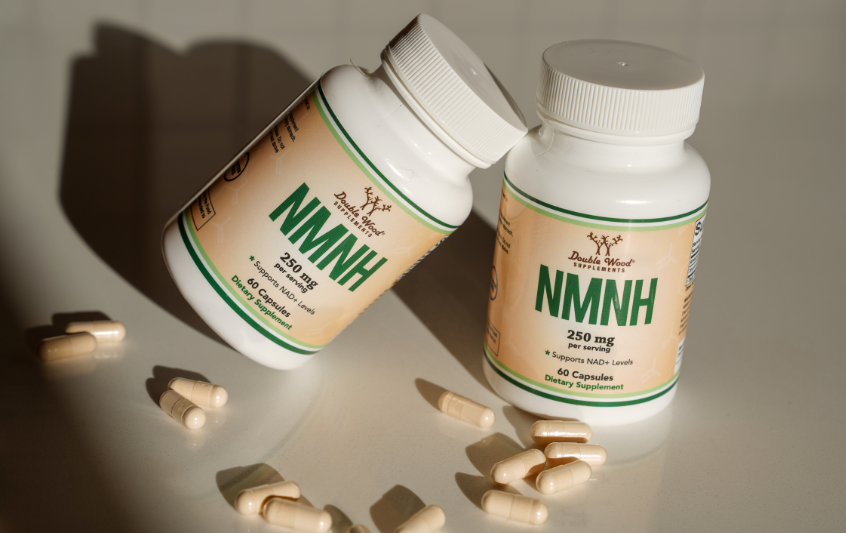NMNH vs. NMN: What's The Difference?
Finding the right supplement for your health needs can be challenging. Nicotinamide Mononucleotide (NMN) and its reduced form, Dihydronicotinamide Mononucleotide (NMNH), both offer unique benefits for cellular metabolism and energy production. With Double Wood Supplements, learn about the differences between these powerful compounds and find out how you can choose the supplement that best suits your individual health and wellness goals.
What is NMN?
NMN, or Nicotinamide Mononucleotide, is a naturally occurring compound that plays a crucial role in cellular energy production. As a direct precursor to Nicotinamide Adenine Dinucleotide (NAD+), NMN is essential for maintaining optimal cellular function. NAD+ is a coenzyme found in all living cells, and it is vital for various metabolic processes, including DNA repair, energy metabolism, and cell survival.
Unfortunately, as we age, the levels of NAD+ in our bodies decline, which can lead to decreased cellular function and various age-related health issues. This decline in NAD+ levels is associated with reduced energy, slower metabolism, and may increase susceptibility to diseases.
NMN supplementation has been shown to elevate NAD+ levels in the body, thereby counteracting some of the negative effects of aging. By boosting NAD+ levels, NMN may help enhance cellular functions, support energy metabolism, and overall health.
NMN Benefits
Increase NAD+ Levels
Boosting NAD+ levels is one of the primary benefits of NMN supplementation. As NAD+ is a vital coenzyme involved in many metabolic processes, higher levels can help counteract the age-related decline in cellular function. Enhanced NAD+ levels improve the efficiency of cellular energy production, support DNA repair, and overall cellular health. This boost in NAD+ can lead to increased energy, better metabolic health, and improved resilience against various age-related conditions.
Support Reproductive Health
NMN has shown promise in supporting reproductive health, particularly in older women. Research indicates that NMN can improve the quality of oocytes (egg cells) by enhancing their nuclear and cytoplasmic competence. This improvement is crucial for older women, as it can lead to better fertility outcomes. By optimizing the environment within the oocytes, NMN helps in maintaining the health and viability of eggs, supporting reproductive success.
Support Cardiovascular Health
NMN can play a significant role in promoting cardiovascular health. It provides cardioprotection by stimulating glycolysis, a metabolic pathway that breaks down glucose to produce energy. By enhancing glycolysis, NMN helps support the heart's functional recovery and overall resilience, reducing the risk of cardiovascular diseases and supporting long-term heart health.
What is NMNH?
NMNH, or Dihydronicotinamide Mononucleotide, is the reduced form of Nicotinamide Mononucleotide (NMN). As a potent enhancer of both Nicotinamide Adenine Dinucleotide (NAD+) and its reduced form, NADH, NMNH plays a critical role in cellular energy production and metabolic regulation.
Unlike NMN, NMNH has unique properties that influence cellular metabolism in distinct ways, offering a different set of benefits for health and wellness. While NMN stimulates glycolysis (the breakdown of glucose for energy), NMNH inhibits glycolysis and the tricarboxylic acid (TCA) cycle, also known as the Krebs cycle. This inhibition can lead to cell cycle arrest and suppression of cell growth. Although these effects may seem counterintuitive, they suggest potential therapeutic applications for NMNH in managing certain cellular conditions.
NMNH Benefits
Increase NAD+ Levels
One of the primary benefits of NMNH is its superior ability to enhance levels of both NAD+ and NADH in the body. NAD+ is a coenzyme crucial for various cellular processes, including energy production, DNA repair, and maintaining overall cellular health. NADH, the reduced form of NAD+, is equally important as it plays a key role in the electron transport chain, which is essential for ATP production and energy metabolism.
By increasing NAD+ and NADH levels, NMNH enhances the body’s ability to produce energy, supports efficient cellular function, and promotes overall metabolic health. This increase can lead to improved vitality, better resistance to age-related decline, and enhanced cellular repair mechanisms.
Regulate Cellular Production
NMNH has unique effects on cellular metabolism, particularly in its ability to regulate glycolysis and the tricarboxylic acid (TCA) cycle. By regulating these pathways, NMNH can help limit cell proliferation, making it a promising candidate for research into treatments for conditions characterized by uncontrolled cell growth such as cancer.
Comparing NMN vs. NMNH
Choosing the right supplement for your health can be daunting, especially when considering compounds with distinct benefits like NMN and NMNH. Both Nicotinamide Mononucleotide (NMN) and Dihydronicotinamide Mononucleotide (NMNH) play crucial roles in cellular metabolism and energy production by boosting NAD+ levels. However, the effects on the body differ, making each one suitable for different health needs and goals.
Understanding these differences is key to making an informed decision. NMN primarily focuses on enhancing cellular energy and heart health by stimulating glycolysis, while NMNH offers more potent NAD+ enhancement and cellular regulation.
|
Potential benefits |
NMN |
NMNH |
|
Increases NAD+ |
✅ |
✅ |
|
Improves metabolic functions |
✅ |
❌ |
|
Regulates cell growth |
❌ |
✅ |
|
Provides cardiovascular protection |
✅ |
❌ |
Support A Healthy Lifestyle With Double Wood Supplements
Related sources
https://pubmed.ncbi.nlm.nih.gov/33793246/
https://www.semanticscholar.org/paper/b13aef300fd8a6afb9fdc10be40bbed5b6f97451
https://www.semanticscholar.org/paper/c9a52fd5a8d8e45876112e9cde49a09d091b92e8
https://www.semanticscholar.org/paper/8a8f038a95f4b41f99efe9165eddb10074414b41
https://pubmed.ncbi.nlm.nih.gov/36636898/

